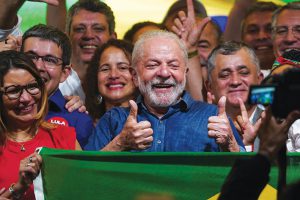Luiz Inacio Lula da Silva won Brazil’s presidential election in a dramatic comeback for the left-wing politician who was languishing in a jail cell for corruption just three years ago.
He defeated the incumbent Jair Bolsonaro with 50.9% to 49.1% of the votes in Sunday’s runoff, according to the official tally. The outcome signals a change in direction for Latin America’s largest economy after a heated campaign that showed extreme polarization among the electorate, and marks the first time a sitting president in Brazil has lost a re-election bid.
“I consider myself as someone who’s been resurrected,†Lula, 77, said in his first speech as president-elect in Sao Paulo. “They tried to bury me alive.â€
Bolsonaro, 67, has yet to concede or comment on the results. Lula told supporters he hasn’t received a phone call from Bolsonaro and O Globo newspaper said he’s been unavailable even for his closest allies. The president’s reaction will be closely watched by investors since he repeatedly questioned the electoral authorities during the campaign, suggesting he might not recognize the result.
Still, Brazil’s lower house Speaker Arthur Lira, a Bolsonaro ally, wrote on social media that the “will of the majority must not be challenged,†while Senate chief Rodrigo Pacheco praised the country’s electronic voting system.
US President Joe Biden quickly congratulated Lula, saying the elections were “free, fair, and credible.†China, Brazil’s largest trading partner, also complimented the president-elect in a Twitter post by its local embassy.
The Brazilian real underperformed most emerging market currencies on Monday, weakening 0.8% at 9:45 a.m. in Sao Paulo after dropping about 2% earlier. Futures on the local stock market also declined, as investors awaited for picks to lead key cabinets including the finance ministry.
In his victory speech, Lula promised to reunite the country after the divisive race, rebuilding ties with other government institutions. His first goal, he added, is to “end hunger again†while attracting foreign investors to re-industrialize the economy. He also pledged “zero deforestation†of the Amazon.
In downtown Rio de Janeiro, a crowd that had gathered in front of the city’s municipal chamber to watch the results erupted in jubilation as the final vote tally ticked in. Red-clad supporters for the president-elect shot off bottle rockets and tossed beers in the air. Couples embraced, others cried.
“It’s been four very hard years, I lost my job in the pandemic and see so many others struggle to get by,†said Flavio Nema, 25, an out-of-work history teacher. “It’s not going to be easy for Lula, he’s got a congress against him.â€
The election exposed the divide between a sizable minority who support Bolsonaro’s right-wing, populist rhetoric, and predominantly poorer voters with memories of better times under Lula, who oversaw an economic surge amid a boom in commodity exports when he ran the country from 2003 to 2010.
Despite his triumph, the president-elect will face a divided country and a divided congress, with Bolsonaro’s allies having captured a large presence in both chambers on top of controlling the country’s three most populous states, Sao Paulo, Minas Gerais and Rio de Janeiro.
“Lula’s challenge of governing is bigger than that of winning the election. Brazilian society needs to be rebuilt in its institutional and fiscal basis,†said Carolina Botelho, a political scientist with the Institute of Advanced Studies at Sao Paulo University.
—Bloomberg
 The Gulf Time Newspaper One of the finest business newspapers in the UAE brought to you by our professional writers and editors.
The Gulf Time Newspaper One of the finest business newspapers in the UAE brought to you by our professional writers and editors.
